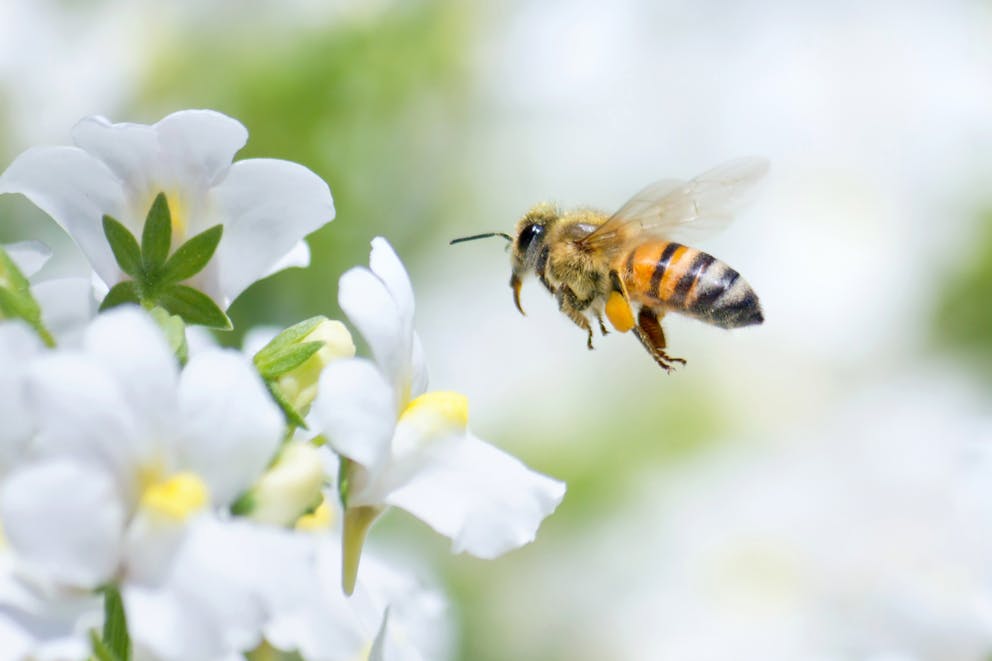Top Bee Pollen Benefits and Uses
While many recognize the critical role bees play in our ecosystem and appreciate the myriad health benefits of raw honey, bee pollen is a lesser-known treasure that also deserves attention.
Discover seven bee pollen benefits and learn why adding bee pollen extract to your routine may significantly improve your health and well-being.

What is bee pollen?
Bee pollen is a remarkable natural substance harvested by bees from the pollen of various flowers, which is then enriched with nectar and digestive enzymes from bee secretions.
“Bee pollen offers numerous health benefits and is a rich source of vitamins, trace minerals, amino acids, and essential fatty acids, and contains various beneficial bacteria and fungi," explains Dr. Berg.
When searching for bee pollen products, you will typically encounter them in two main forms: raw bee pollen and bee bread.
Raw bee pollen are small, multi-colored granules, which reflect the diversity of flower pollen the bees have harvested.
Bee bread is a fermented variant of bee pollen that is considered more potent and resembles large dark amber pellets or comes in a glossy paste form.
Watch the video below to learn more about the benefits and uses of bee pollen.
7 bee pollen benefits
Bee pollen granules are a compact bundle of nutrients enriched with over 250 bioactive compounds, contributing to its impressive health benefits.
Here are seven health benefits of bee pollen.
1. May reduce allergic reactions
Bee pollen may be an effective therapy to help desensitize the body to pollen and reduce symptoms of seasonal allergic rhinitis, also known as seasonal allergy.
Bee pollen consumption can help condition the immune system to small concentrations of potential allergens, which may build up tolerance to various allergy triggers.
This has been confirmed by evidence published in Phytotherapy Research reporting that gradual bee pollen exposure over time reduced the histamine response in mast cells, which triggers common allergy symptoms, including sneezing and sinus congestion.
2. Powerful anti-inflammatory properties
The anti-inflammatory effects of bee pollen are attributed to its high content of flavonoids, such as quercetin, which is known to inhibit enzyme activity that triggers inflammation.
As demonstrated by a study published in Nutrients, a polyphenol-rich extract of bee pollen significantly decreased, and in some cases prevented, the development of atherosclerosis, a condition characterized by the inflammation of the arteries.
3. Promotes strong immune defenses
Complimentary to its anti-inflammatory properties, bee pollen is a rich source of minerals such as zinc, magnesium, and selenium, all of which fortify the immune system and enhance the body’s ability to fight infections.
Additionally, bee pollen’s high concentrations of vitamins C and E can support immune defenses by protecting cells from oxidative damage and supporting the production of immune cells and antibodies.

4. Promotes wound healing
Bee pollen's anti-inflammatory properties have been shown to accelerate wound healing.
A study published in Evidence-Based Complementary and Alternative Medicine showed that bee pollen's rich composition of proteins, fatty acids, flavonoids, and phenolic acids work synergistically to help reduce inflammation and heal burned skin tissue.
Compounds found in bee pollen, such as kaempferol, strengthen connective tissue and help seal blood vessels, enhancing blood flow and tissue repair while reducing swelling.
Moreover, the natural antibacterial qualities of bee pollen play a crucial role in preventing infections, reinforcing its multifaceted potential for healing wounds.
5. Natural antimicrobial and antifungal properties
According to research published in Nutrients, certain bee pollen extracts were effective against potentially harmful bacteria, including Staphylococcus, Escherichia coli, Klebsiella, and Pseudomonas, as well as fungi such as Candida, a common yeast infection.
This highlights bee pollen's ability to provide a broad-spectrum defense against various pathogens, improve immunity, and help maintain the balance of the gut microbiome by restricting the overgrowth of potentially harmful microbes.
6. Rich in antioxidants
Bee pollen granules contain polyphenols and other antioxidant nutrients, including vitamins C, E, and certain B vitamins.
These vitamins play a crucial role in lowering the risk of oxidative stress by neutralizing free radicals that can cause cellular damage and may contribute to chronic diseases such as cardiovascular disease, diabetes, and cancer.
7. Potential anti-tumor properties
Bee pollen's potential to exhibit anti-tumor properties is mainly attributed to its rich composition of polyphenols.
Research published in Molecular Medicine Reports showed that bee pollen from Rosa rugosa was associated with a growth reduction of tumor cells, highlighting its potential applications for cancer prevention.

How to use bee pollen
Bee pollen is becoming increasingly recognized for its various health-promoting properties, and bee pollen products are widely available.
Here are a few different ways to incorporate bee pollen into your routine and take advantage of its impressive health benefits.
Skincare
Bee pollen’s rich antioxidant content is often utilized in skin care products to help reduce signs of aging and skin damage as antioxidants help combat free radicals damage, contributing to healthier, more resilient skin.
Exotic garnish
Bee pollen's unique burst of color and mildly sweet, floral taste make it a healthy and versatile culinary ingredient that can enhance the flavor profile and nutritional value of various dishes.
Dietary supplements
Incorporating bee pollen in supplemental form offers a convenient and effective way to harness its beneficial properties.
For bee pollen, a typical dose ranges from 20 to 40 grams daily, taken three times before meals for up to three months. Cycles may be repeated two to four times annually.
Bee bread's recommended dose is around 30 grams per day, leveraging fermentation for better nutrient delivery and immune support.
Bee pollen extracts
Research published in Innovative Food Science & Emerging Technologies found that ethanol extraction of bee pollen significantly enhances its polyphenol content, amplifying its bioactive properties and potential health benefits.
Taking bee pollen as an extract provides a potent dietary supplement or skincare option for those seeking to incorporate it into their health regimen more effectively.

Bee pollen safety
While bee pollen appears to be safe for most people, it's important to note that scientific research on bee pollen is still ongoing to fully understand its efficacy, optimal dosage, and safety, especially for allergy desensitization.
A significant concern is the unpredictable nature of the pollen collected by bees, which may contain allergens that can cause severe reactions in those with pollen allergies or sensitivities to the venom from bee stings.
Consequently, consuming bee pollen might not be safe for everyone, particularly for individuals with allergies, pregnant and breastfeeding women, children, and those taking medications such as blood thinners.
With this in mind, consulting a healthcare provider for personalized advice before starting bee pollen supplements or treatments is crucial.

Key takeaways
In summary, bee pollen harvested from various flowers is a powerhouse of nutrition and therapeutic benefits. The wide array of vitamins, minerals, essential amino acids, and antioxidants in bee pollen contribute to its well-deserved status as a superfood.
Bee pollen benefits include allergy relief, anti-inflammatory properties, immune system support, antimicrobial and antifungal effects, wound healing benefits, and potential anti-tumor capabilities.
FAQ
1. What are the top bee pollen benefits?
Bee pollen offers many health benefits, including the potential to reduce allergic reactions, support the immune system, promote wound healing, and lower cancer risk.
2. Who shouldn’t use bee pollen?
Bee pollen should be used cautiously or avoided by pregnant and breastfeeding women, children, people taking blood thinners, and those with allergies to pollen, bees, or bee products. Always consult a healthcare provider before starting any new supplement.
3. How is bee pollen used?
Bee pollen can be used in various ways, including as a dietary supplement, a garnish on foods, incorporated into skin care products, or taken as a bee pollen extract.
4. How much bee pollen should you take?
The recommended daily bee pollen intake for adults is 20 to 40 grams, taken three times a day before meals for up to three months.
Bee bread dosage is suggested at 30 grams per day, and it’s best to start with lower doses and gradually increase intake to minimize the risk of side effects.
5. Can bee pollen help with allergies?
Yes, bee pollen has shown the potential to help reduce allergic reactions by desensitizing the body to pollen, which may help reduce symptoms of seasonal allergic rhinitis.
Sources
Previous blog
What Does an Electrolyte Do?Next blog
Are Nuts Making You Gain Weight?Tags

Popular
08/21/2024
55K views
02/23/2025
46.3K views
11/18/2024
277.5K views
03/18/2024
11/21/2022




